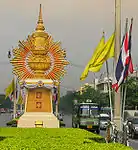Great Crown of Victory
The Great Crown of Victory (Thai: พระมหาพิชัยมงกุฎ; RTGS: Phra Maha Phichai Mongkut) is one of the regalia of Thailand. Made of gold and enamelled in red and green during the reign of King Rama I in 1782, the crown is 66 centimeters (26 inches) high and weighs 7.3 kg (16 pounds). In the reign of King Rama IV, a set of diamonds was added to the crown. Also added was a large cut diamond from India to decorate the top of the crown, called the Great Diamond (พระมหาวิเชียรมณี Phra Maha Wichian Mani). The crown is of a distinctive Thai design, being a multi-tiered conical diadem, terminating in a tapering spire.

The crown is worn only when a king is crowned. He places the crown on his own head. The shape of the crown represents the concept of divine monarchy. The tall spire signifies divine authority and the right to rule over his subjects.
The Great Crown of Victory is the most important of the five regalia of Thailand, yet at one time the crown was accorded the same importance as the other regalia.
As symbol
The Great Crown of Victory is used as part of symbol in many public organization and educational institutions. The rank insignia of Royal Thai Army and Royal Thai Police field grade officers (Major and above) all depicts the grand crown.
Gallery
.svg.png.webp) The Great Crown of Victory (heraldic version)
The Great Crown of Victory (heraldic version) The Great Crown of Victory (heraldic version), drawn by Hugo Gerard Ströhl
The Great Crown of Victory (heraldic version), drawn by Hugo Gerard Ströhl.svg.png.webp) The privy seal of King Mongkut (Rama IV), depicting the Great Crown of Victory.
The privy seal of King Mongkut (Rama IV), depicting the Great Crown of Victory. Flag of the Minister of Defence of Thailand since 1936.
Flag of the Minister of Defence of Thailand since 1936..jpg.webp) A replica of the Great Crown of Victory for the mast of the royal yacht Mahachakri II, Royal Thai Naval Museum, Samut Prakan.
A replica of the Great Crown of Victory for the mast of the royal yacht Mahachakri II, Royal Thai Naval Museum, Samut Prakan. The Great Crown of Victory exhibit showing Thai regalia in honour of the 60th anniversary of King Bhumibol Adulyadej's accession to the throne in 2006.
The Great Crown of Victory exhibit showing Thai regalia in honour of the 60th anniversary of King Bhumibol Adulyadej's accession to the throne in 2006.
References
- "The royal regalia and royal utensils of Siam". chiangmai-chiangrai.com. Archived from the original on 6 September 2017.